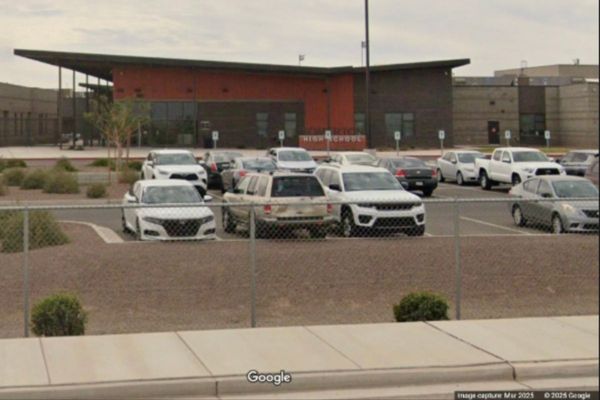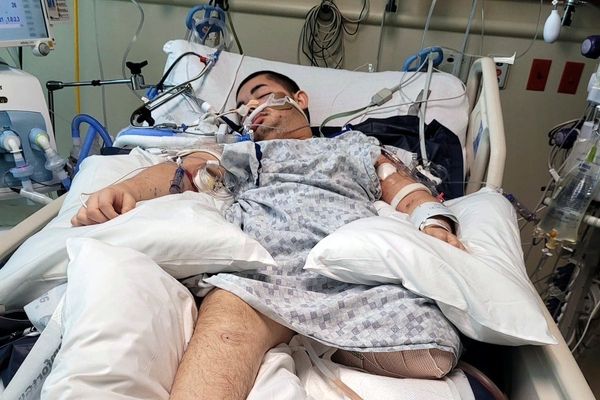
Nasrat Ahmad Yar, like thousands of other Afghans, came to the United States in the wake of the 2021 Taliban takeover, using a special visa for those who worked for the US military.
The 31-year-old interpreter envisioned a new life where he, his wife and his four children — aged 13, 11, 8 and 15 months — could live safely, make money, go to school and prosper, his friend Rahim Amini told Al Jazeera.
Instead, shortly after midnight on July 3, Ahmad Yar was found shot to death inside of his car, which he was driving for the Lyft rideshare company, in a neighbourhood in northeast Washington, DC.
“He was not my blood brother, but he was more than that to me,” Amini said. “The only times we were separate from each other was when he was sleeping. We worked together, laughed together, were eating together.”
The two men had met at the Bagram Air Base in Afghanistan during Ahmad Yar’s 10-year stint as an interpreter for the US military. Like Ahmad Yar, Amini fled the country after the Taliban takeover in August 2021.

But Ahmad Yar initially had to stay behind, though he vowed to look after Amini’s family as they holed up in Mazar-i-Sharif, a city defended by government security forces in northern Afghanistan.
Mazar-i-Sharif fell to Taliban control in mid-August, and Ahmad Yar eventually fled to the United Arab Emirates. He then left for the US.
“I’m so happy that I’m in America,” the 36-year-old Amini remembered his friend saying. “I am safe. My children will be educated here.”
In the wake of his death, attention has now turned to Ahmad Yar’s family, with friends from his work with the US military and the local Afghan community launching fundraising efforts.
Those include drives on GoFundMe and Facebook.
“It is a difficult time for the family and also for the community,” Noorullah Ahmadzai, an Afghan community leader in the Washington, DC, area, told Al Jazeera. “This tragedy will affect everyone in one way or [another].”
He added that Ahmad Yar’s story resonates with many of the Afghans who have relocated to the area. As of June, the State Department estimates that 97,000 Afghans have resettled in the US since September 2021.
Even for the few thousand admitted on so-called Special Immigrant Visas (SIVs) — who tend to have more education, speak English and have authorisation to work — moving to the US still means “starting a life from scratch”.
“Whatever your situation, you have to pay the bills,” Ahmadzai said.”Nobody gives you the money. So the quickest way is to start an Uber and Lyft account so you can start earning.”
“Then they become quite busy at that job because it takes up much of the day and evening, weekends and nights,” he said. “So there isn’t time to actually look for professional jobs or to network to find out professional careers.”
A 2022 report by the Gig Workers Rising campaign found that at least 50 delivery and rideshare drivers performing so-called “gig work” were murdered in the US between 2017 and early 2022.
Meanwhile, gun violence remains pervasive. In a country with a population of about 331 million people, the rate of gun deaths regularly ranks several times higher than in other developed countries.
That number hit a peak in 2021, according to the US Centers for Disease Control and Prevention. More than 48,830 people died from gun-related injuries, a number greater than any other year on record.
And so far in 2023, there have been nearly 10,000 gun-related deaths, excluding suicides, according to the Gun Violence Archive, a nonprofit that tracks shootings in the US.
Search for safety
After arriving in the US, Ahmad Yar initially settled in northern Philadelphia, Pennsylvania. But he told Amini that he had been confronted by gunmen demanding money there.
Amini convinced him to move to Virginia, which he thought would be safer.
He recalled Ahmad Yar as a man driven to help others, working long hours to support both his family in the US as well as his siblings and parents still in Afghanistan.

The arithmetic of hours worked and money earned was hard for Ahmad Yar to resist, given his family’s need, Amini said.
“I’m not working 12 hours. I’m working 20 hours,” he remembered his friend saying. “In eight hours, I can make an extra $100 to $150 for the family in Afghanistan. I can feed them for a month.”
For its part, a spokesperson for Lyft said in a statement: “Our hearts are with Mr Nasrat’s loved ones as they confront this unspeakable tragedy. We have reached out to his family to offer our support and are in contact with law enforcement to assist with their investigation.”
Meanwhile, the Metropolitan Police Department in Washington, DC, released surveillance footage of four suspects seen fleeing the area after Ahmad Yar’s killing.
On Thursday, they said the investigation was ongoing, with an award of $25,000 offered for information leading to an arrest and conviction.
Amini remembered his friend as someone with a “totally different character” than other people.
“He was always trying to make the community very happy. He was so generous,” he said.
He hopes that generosity comes back around for Ahmad Yar’s family.
“Now it’s time to make his family happy,” he said. “Because there is no one to pay the rent, to buy clothes, groceries. They need the attention.”







